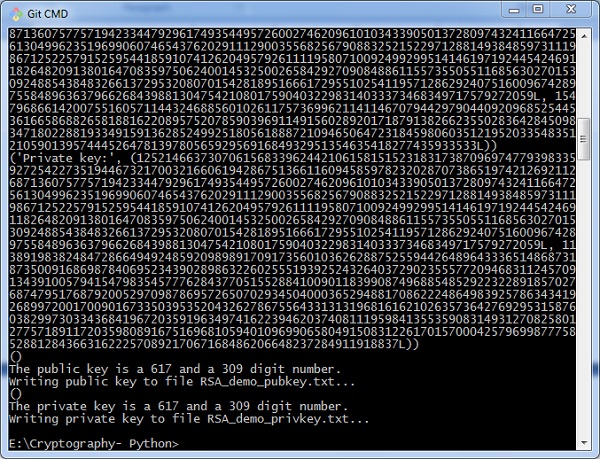Création de clés RSA
Dans ce chapitre, nous nous concentrerons sur l'implémentation par étapes de l'algorithme RSA à l'aide de Python.
Générer des clés RSA
Les étapes suivantes sont impliquées dans la génération des clés RSA -
Créez deux grands nombres premiers à savoir p et q. Le produit de ces nombres sera appelén, où n= p*q
Générer un nombre aléatoire qui est relativement premier avec (p-1) et (q-1). Que le numéro soit appelé comme e.
Calculez l'inverse modulaire de e. L'inverse calculé sera appelé commed.
Algorithmes de génération de clés RSA
Nous avons besoin de deux algorithmes principaux pour générer des clés RSA à l'aide de Python - Cryptomath module et Rabin Miller module.
Module Cryptomath
Le code source du module cryptomath qui suit toute l'implémentation de base de l'algorithme RSA est le suivant -
def gcd(a, b):
while a != 0:
a, b = b % a, a
return b
def findModInverse(a, m):
if gcd(a, m) != 1:
return None
u1, u2, u3 = 1, 0, a
v1, v2, v3 = 0, 1, m
while v3 != 0:
q = u3 // v3
v1, v2, v3, u1, u2, u3 = (u1 - q * v1), (u2 - q * v2), (u3 - q * v3), v1, v2, v3
return u1 % mModule RabinMiller
Le code source du module RabinMiller qui suit toute l'implémentation de base de l'algorithme RSA est le suivant -
import random
def rabinMiller(num):
s = num - 1
t = 0
while s % 2 == 0:
s = s // 2
t += 1
for trials in range(5):
a = random.randrange(2, num - 1)
v = pow(a, s, num)
if v != 1:
i = 0
while v != (num - 1):
if i == t - 1:
return False
else:
i = i + 1
v = (v ** 2) % num
return True
def isPrime(num):
if (num 7< 2):
return False
lowPrimes = [2, 3, 5, 7, 11, 13, 17, 19, 23, 29, 31, 37, 41, 43, 47, 53, 59, 61,
67, 71, 73, 79, 83, 89, 97, 101, 103, 107, 109, 113, 127, 131, 137, 139, 149, 151,
157, 163, 167, 173, 179, 181, 191, 193, 197, 199, 211, 223, 227, 229, 233, 239, 241,
251, 257, 263, 269, 271, 277, 281, 283, 293, 307, 311, 313,317, 331, 337, 347, 349,
353, 359, 367, 373, 379, 383, 389, 397, 401, 409, 419, 421, 431, 433, 439, 443, 449,
457, 461, 463, 467, 479, 487, 491, 499, 503, 509, 521, 523, 541, 547, 557, 563, 569,
571, 577, 587, 593, 599, 601, 607, 613, 617, 619, 631, 641, 643, 647, 653, 659, 661,
673, 677, 683, 691, 701, 709, 719, 727, 733, 739, 743, 751, 757, 761, 769, 773, 787,
797, 809, 811, 821, 823, 827, 829, 839, 853, 857, 859, 863, 877, 881, 883, 887, 907,
911, 919, 929, 937, 941, 947, 953, 967, 971, 977, 983, 991, 997]
if num in lowPrimes:
return True
for prime in lowPrimes:
if (num % prime == 0):
return False
return rabinMiller(num)
def generateLargePrime(keysize = 1024):
while True:
num = random.randrange(2**(keysize-1), 2**(keysize))
if isPrime(num):
return numLe code complet pour générer des clés RSA est le suivant -
import random, sys, os, rabinMiller, cryptomath
def main():
makeKeyFiles('RSA_demo', 1024)
def generateKey(keySize):
# Step 1: Create two prime numbers, p and q. Calculate n = p * q.
print('Generating p prime...')
p = rabinMiller.generateLargePrime(keySize)
print('Generating q prime...')
q = rabinMiller.generateLargePrime(keySize)
n = p * q
# Step 2: Create a number e that is relatively prime to (p-1)*(q-1).
print('Generating e that is relatively prime to (p-1)*(q-1)...')
while True:
e = random.randrange(2 ** (keySize - 1), 2 ** (keySize))
if cryptomath.gcd(e, (p - 1) * (q - 1)) == 1:
break
# Step 3: Calculate d, the mod inverse of e.
print('Calculating d that is mod inverse of e...')
d = cryptomath.findModInverse(e, (p - 1) * (q - 1))
publicKey = (n, e)
privateKey = (n, d)
print('Public key:', publicKey)
print('Private key:', privateKey)
return (publicKey, privateKey)
def makeKeyFiles(name, keySize):
# Creates two files 'x_pubkey.txt' and 'x_privkey.txt'
(where x is the value in name) with the the n,e and d,e integers written in them,
# delimited by a comma.
if os.path.exists('%s_pubkey.txt' % (name)) or os.path.exists('%s_privkey.txt' % (name)):
sys.exit('WARNING: The file %s_pubkey.txt or %s_privkey.txt already exists! Use a different name or delete these files and re-run this program.' % (name, name))
publicKey, privateKey = generateKey(keySize)
print()
print('The public key is a %s and a %s digit number.' % (len(str(publicKey[0])), len(str(publicKey[1]))))
print('Writing public key to file %s_pubkey.txt...' % (name))
fo = open('%s_pubkey.txt' % (name), 'w')
fo.write('%s,%s,%s' % (keySize, publicKey[0], publicKey[1]))
fo.close()
print()
print('The private key is a %s and a %s digit number.' % (len(str(publicKey[0])), len(str(publicKey[1]))))
print('Writing private key to file %s_privkey.txt...' % (name))
fo = open('%s_privkey.txt' % (name), 'w')
fo.write('%s,%s,%s' % (keySize, privateKey[0], privateKey[1]))
fo.close()
# If makeRsaKeys.py is run (instead of imported as a module) call
# the main() function.
if __name__ == '__main__':
main()Production
La clé publique et les clés privées sont générées et enregistrées dans les fichiers respectifs comme indiqué dans la sortie suivante.
